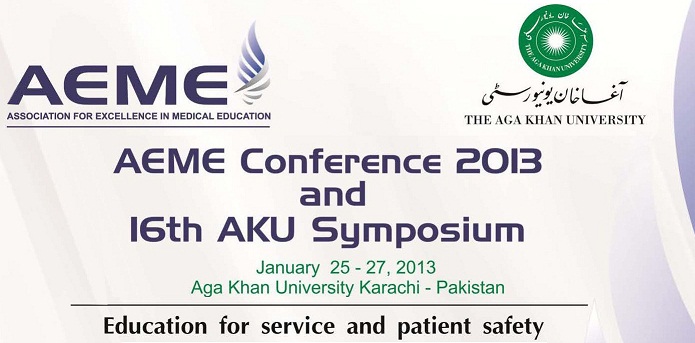Day 1 : Oral Presentations (Theme: Patient Safety)
Prevalence and causes of wrong time medication administration errors: Experience at atertiary care hospital, Karachi, Pakistan
Location
Lecture Hall 2
Start Date
26-1-2013 11:00 AM
Abstract
Background: Wrong time medication administration error (WTMAE) is a high risk to patient safety. It can result in severe harm, death or fatal consequences. No major study has yet focused on this issue from the developing world. To help recognize and prevent such errors, technology has been developed such as the electronic medication administration record (eMAR) system which helps administering the medication on-time.The study is to investigate the prevalence of WTMAEs via eMAR and to explore the contributing factors of WTMAE.
Methods: A descriptive study design with quantitative research approach was used for the study. The data was gathered from electronic medication administration record (eMAR) system. The study was conducted at a private tertiary care university hospital in Karachi, Pakistan. The data was collected from adult medical, adult surgical, pediatric, intensive care unit and coronary care unit for 90 consecutive days. SPSS version 19.0 was used for the descriptive statistical analysis.
Results: Total 250,213 doses were observed out of which 231,380 (92.5%) doses were administered and 18,833 (7.5%) doses were not administered or were missing doses. Administered doses (n= 231,380) were further analyzed and identified for on-time administration (n=191,994; 83%) and wrong time administration (n=39,386; 17%). Study resulted highest percentage of WTMAE during the night shift.
Conclusions: Medication administration is a complex process and WTMAE is another major area of focus. The study increased the evidence of the frequency of WTMAE. It proved that by using this great innovation of technology in the form of eMAR can significantly reduce medication administration error (MAE). The study also highlighted major issues of MAE that are necessary to deal within the present time. Study help to enforce on-time documentation policy.
Key words: Medication, Administration, Error
Prevalence and causes of wrong time medication administration errors: Experience at atertiary care hospital, Karachi, Pakistan
Lecture Hall 2
Background: Wrong time medication administration error (WTMAE) is a high risk to patient safety. It can result in severe harm, death or fatal consequences. No major study has yet focused on this issue from the developing world. To help recognize and prevent such errors, technology has been developed such as the electronic medication administration record (eMAR) system which helps administering the medication on-time.The study is to investigate the prevalence of WTMAEs via eMAR and to explore the contributing factors of WTMAE.
Methods: A descriptive study design with quantitative research approach was used for the study. The data was gathered from electronic medication administration record (eMAR) system. The study was conducted at a private tertiary care university hospital in Karachi, Pakistan. The data was collected from adult medical, adult surgical, pediatric, intensive care unit and coronary care unit for 90 consecutive days. SPSS version 19.0 was used for the descriptive statistical analysis.
Results: Total 250,213 doses were observed out of which 231,380 (92.5%) doses were administered and 18,833 (7.5%) doses were not administered or were missing doses. Administered doses (n= 231,380) were further analyzed and identified for on-time administration (n=191,994; 83%) and wrong time administration (n=39,386; 17%). Study resulted highest percentage of WTMAE during the night shift.
Conclusions: Medication administration is a complex process and WTMAE is another major area of focus. The study increased the evidence of the frequency of WTMAE. It proved that by using this great innovation of technology in the form of eMAR can significantly reduce medication administration error (MAE). The study also highlighted major issues of MAE that are necessary to deal within the present time. Study help to enforce on-time documentation policy.
Key words: Medication, Administration, Error

